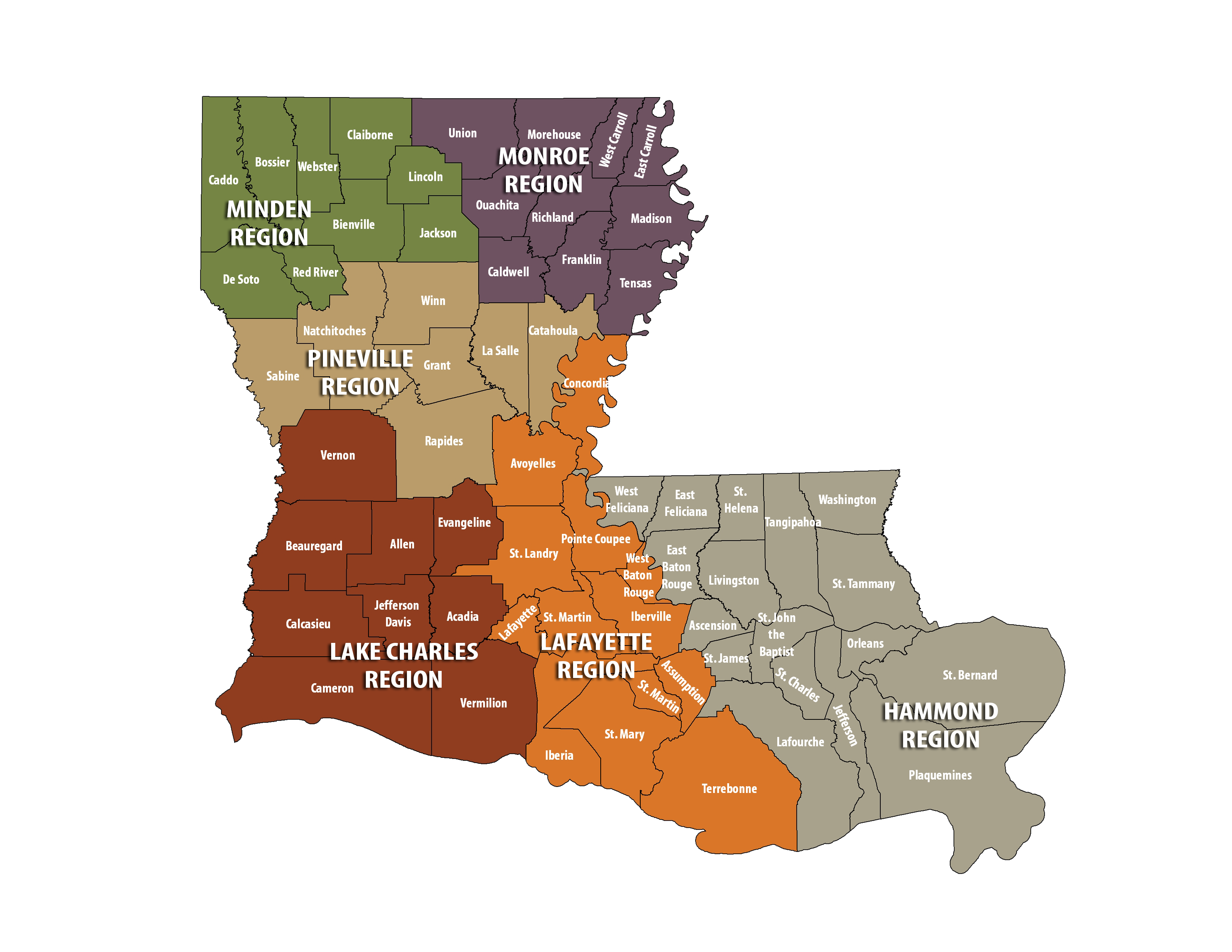| Regional Office | Parishes Served | Address | Phone | Fax |
|---|---|---|---|---|
| Hammond Field Office | Ascension, East Baton Rouge, East Feliciana, Jefferson, Lafourche, Livingston, Orleans, Plaquemines, St. Bernard, St. Charles, St. Helena, St. James, St. John the Baptist, St. Tammany, Tangipahoa, Washington, and West Feliciana | 42371 Phyllis Ann Drive Hammond, LA 70403 |
985.543.4777 | |
| Lafayette Field Office | Assumption, Avoyelles, Concordia, Iberia, Iberville, Lafayette, Pointe Coupee, St. Landry, St. Martin, St. Mary, Terrebonne, and West Baton Rouge | 200 Dulles Drive Lafayette, LA 70506 |
337.262.2080 | |
| Lake Charles Field Office | Acadia, Allen, Beauregard, Calcasieu, Cameron, Evangeline, Jefferson Davis, Vermilion, and Vernon | 1213 North Lakeshore Drive Lake Charles, LA 70601 |
337.491.2575 | 337.491.2009 |
| Minden Field Office | Bienville, Bossier, Caddo, Claiborne, De Soto, Jackson, Lincoln, Red River, and Webster | 9961 Hwy 80 Minden, LA 71055 |
318.371.3050 | 318.371.3052 |
| Monroe Field Office | Caldwell, East Carroll, Franklin, Madison, Morehouse, Ouachita, Richland, Tensas, Union, and West Carroll | 368 Century Link Drive Monroe, LA 71203 |
318.343.4044 | 318.345.0797 |
| Pineville Field Office | Catahoula, Grant, LaSalle, Natchitoches, Rapides, Sabine, and Winn | 765 Maryhill Road Pineville, LA 71360 |
318.487.5885 | 318.487.5886 |
Nuisance Wildlife Control and Removal
LDWF does not remove nuisance wildlife. Instead, LDWF permits individuals Nuisance Wildlife Control Operators to provide this services for a fee. Nuisance Wildlife Control Operators are permitted to handle most species except deer, bears, migratory birds, and alligators.
There are more than 100 permitted Nuisance Wildlife Control Operators located across the state. Contact the Nuisance Wildlife Control Operator closest to you for assistance with nuisance wildlife. Nuisance Wildlife Control Operators are not employees of LDWF or the State of Louisiana.
In addition, LDWF licenses Nuisance Alligator Hunters across the state to capture nuisance alligators and minimize conflicts between alligators and humans. If you’re experiencing problems with a nuisance alligator, contact the LDWF offices listed on the Nuisance Alligators page.
What You Can Do to Prevent or Resolve Nuisance Wildlife Issues
Calling a professional is not always necessary. You can prevent or resolve some issues with nuisance wildlife on your own.
Make sure there is no food for wildlife available around your home.
- Never feed wild animals.
- Don’t leave pet food out at night.
- Secure trash can lids and compost heaps.
- Don’t leave domestic animals that may be potential prey loose or in shoddy or weak shelters.
Eliminate areas that can possibly be used by wildlife as shelter.
- Seal any holes that may give wildlife access to your attic or the interior of your home. Some species of bats can fit through holes the size of a dime. Keeping your home well-maintained is imperative for keeping nuisance animals out.
- Install skirting under mobile homes to prevent animals from going underneath. Use chicken wire or lattice used under raised houses.
- Keep grass mowed to eliminate cover for wildlife.
- Eliminate piles of wood or debris that can be used as shelter.
Live trap the animal and release it.
- Louisiana Administrative Code Title 76 outlines the rules for live trapping and releasing wildlife without a permit.
- It can be dangerous to handle trapped animals. It is often easier to get an animal into a trap than to get one out. Wear heavy leather gloves and use extreme caution when releasing animals. Always stand behind the trap and point the open end toward a clear area when releasing the animal.
- Should you get bitten, don’t release the animal if it hasn’t already been released. Contact the state public health veterinarian for instructions on having the animal tested for rabies and contact your doctor. If you have already released the animal and can’t immediately recapture it, still contact the state public health veterinarian and your doctor. Animals that appear healthy may be sick. Certain mammals including bats and skunks may be infected with rabies and can transmit it to humans. Rabies is fatal to humans if not treated before symptoms develop.
- Release trapped animals at least five miles from where they were trapped to prevent their return.
- Avoid trapping in the spring and early summer, which are breeding seasons for most wildlife. Removing adult animals may result in orphaning young animals. If orphaned young are in an attic or under a house, they could die, which could cause additional issues as they decay.
- LDWF does not loan or rent traps. Traps are available from some parish animal control offices. You can also purchase traps at hardware stores and lawn and garden centers.
Take of some nuisance animals is permitted.
See the Outlaw Quadrupeds and Nuisance Nutrias and Beavers pages for additional information.
More Information
- Louisiana Bear Wise
- Urban Coyote Research Project
- Wildlife Damage Management Technical Series: Coyotes
- The Internet Center for Wildlife Damage Management
- Honeybee Removal and Swarm Collection
- Centers for Disease Control and Prevention Rabies Information
- Louisiana Animal Disease Diagnostic Laboratory Rabies Testing
- Louisiana Department of Health Rabies Information
- Centers for Disease Control and Prevention West Nile Virus Information
- Louisiana Department of Health West Nile Virus Information
If you need assistance, please contact your Regional Wildlife Office:

